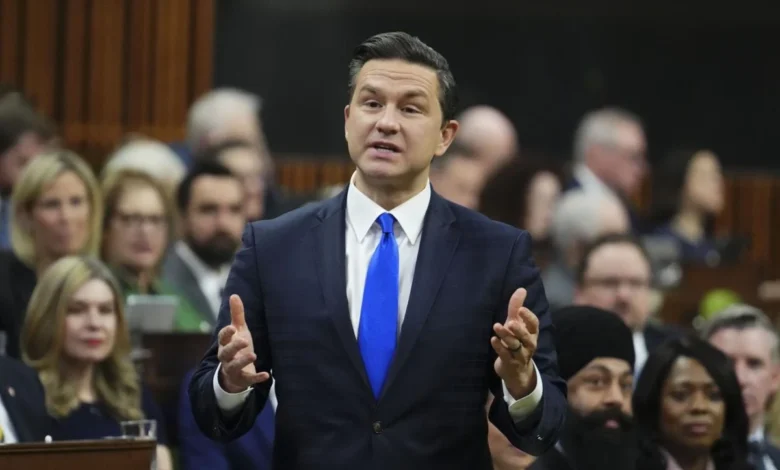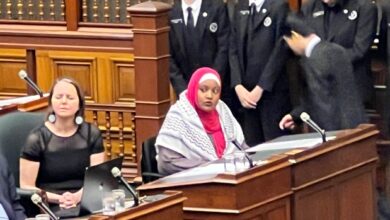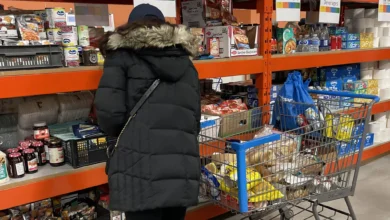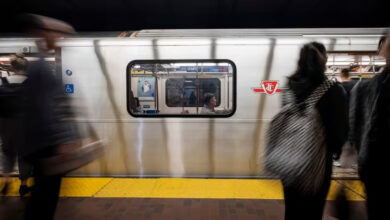Pierre Poilievre tries to bait Justin Trudeau into forcing an election over carbon levy increase

Conservative Leader Pierre Poilievre is baiting Prime Minister Justin Trudeau to call an election, as he threatens to introduce a motion of non-confidence in the Liberals’ minority government over the next scheduled increase in the federal carbon price.
It’s a gambit that’s unlikely to trigger an election since the opposition NDP has pledged to prop up the government as long as their parliamentary alliance holds. But the Conservatives are trying to keep political pressure on Trudeau’s Liberals ahead of the April 1 escalation in the government’s central policy to fight climate change, when the national minimum carbon price is set to rise from $65 per tonne of greenhouse gas emissions, to $80. The cash rebates Ottawa sends to households where the federal price applies — including in Ontario — are also set to go up.
“I’m giving Trudeau one last chance to spike his hike,” Poilievre said in a public speech to his caucus on Parliament Hill Wednesday.
“I’m announcing that if Trudeau does not declare today an end to his forthcoming tax increases on food, gas and heat, that we will introduce a motion of non-confidence in the prime minister.”
Poilievre’s motion — tabled for a potential vote this week — says the House of Commons should declare non-confidence in the Liberal government over the carbon price increase, and call for Parliament “to be dissolved so Canadians can vote in a carbon tax election.”
By convention, if a majority of MPs declare non-confidence in a sitting government, the prime minister is expected to call for an election.
Riding high in the polls, Poilievre’s Conservatives have welcomed the idea of fighting an election over the federal carbon price. And on Wednesday, during Question Period, the Tory leader repeatedly dared Trudeau to take the argument to the polls.
“If he really wants to contest and argue that he should be able to raise the tax, why does he not have the courage to call an election and let Canadians decide?” Poilievre asked.
Referring to the campaigns of 2015, 2019 and 2021, Trudeau responded: “An election on the price on pollution? We had three, and we won them all.”
“Mr. Speaker, then he should not be afraid to have one more,” Poilievre shot back.
Trudeau’s minority Liberals currently govern through an arrangement with the New Democrats, who are voting with them on confidence matters in exchange for action on their key priorities. Like the Liberals, the federal NDP has championed carbon pricing as a key tool in the fight against climate change. On Wednesday, NDP Leader Jagmeet Singh and his 24 MPs voted with the Bloc Québécois and governing Liberals to defeat a Conservative motion calling for the cancellation of the April 1 carbon price increase.
Poilievre, meanwhile, has long demanded an end to the federal carbon price on consumer fuels — though he has not clearly stated what he would do with the other component of the carbon pricing scheme, a required system for heavy industries.
His party blames the consumer carbon levy for unjustifiably contributing to cost-of-living pressures on food, home heating and other goods.
In recent days, the premiers of seven provinces — including from the Liberal government in Newfoundland — have joined Poilievre’s calls for Ottawa to pause the April 1 carbon price increase, while Ontario Liberal Leader Bonnie Crombie has said her party would not create a consumer carbon levy in the province.
The federal Liberals argue Conservative critiques of the carbon price are misleading since the party routinely neglects or downplays the impact of rebates to households under the pricing system. A family of four in Ontario, for instance, is set to get $280 every three months after the carbon price increase on April 1, to offset increased costs from the consumer carbon levy.
The federal government estimates carbon pricing could be responsible for up to a third of the emissions reductions Canada needs to hit its 2030 target of reducing pollution that causes climate change to at least 40 per cent below 2005 levels.
“Pierre Poilievre has been consistently lying to Canadians when he says that pricing pollution and being a responsible steward of the environment is having a negative impact on inflation,” said Liberal MP Adam van Koeverden, who is parliamentary secretary to Environment Minister Steven Guilbeault.
Paul Kershaw, a University of British Columbia professor who appeared with Liberal MPs to defend carbon pricing on Wednesday, pointed to research from the University of Calgary, which concluded B.C.‘s provincial carbon tax of $65 per tonne added less than 0.3 per cent to the cost of “most goods and services.”
“So if you’re hoping that once we end the price on pollution that somehow the affordability pressures go away, well, you’re dreaming,” he said.
According to government statistics, the federal fuel charge currently adds 14 cents per litre to the cost of gasoline, a total that will climb to more than 17 cents per litre when the price increases April 1.
The United Nations’ leading scientific effort to study climate change has warned time is running out to avoid the worst extremes of the warming world, which could include more frequent and severe extreme floods, droughts and wildfires, the destruction of nature, and more.
Source: thestar.com






